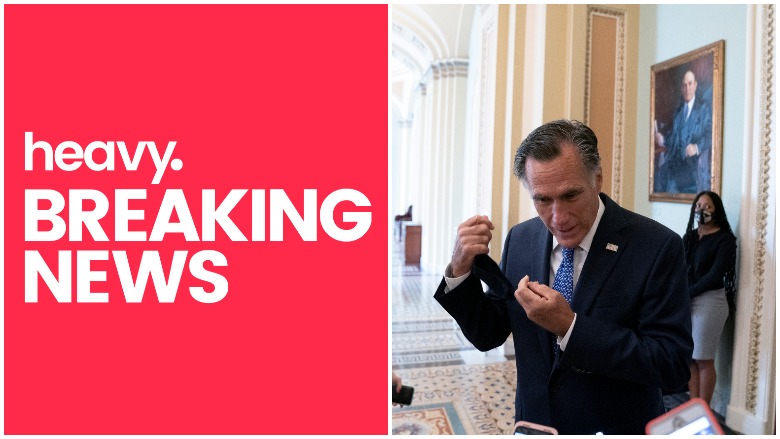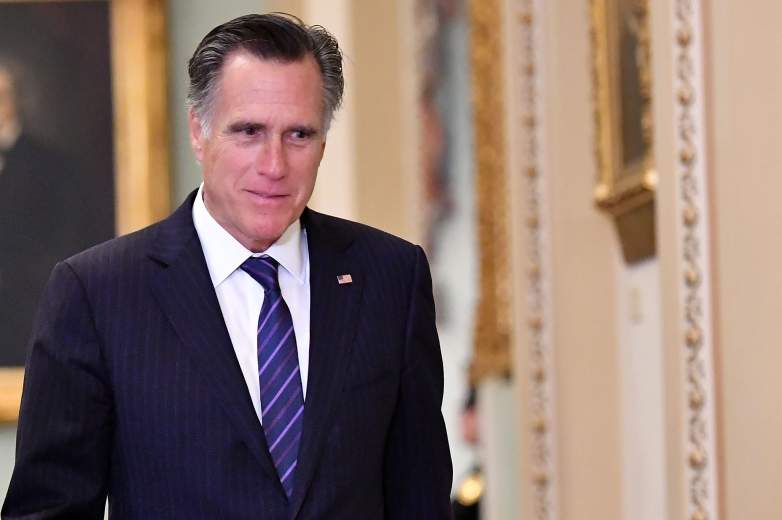
Utah Republican Senator Mitt Romney on Tuesday morning ended speculation about whether he would support a vote on President Trump’s nominee to replace Justice Ruth Bader Ginsburg on the Supreme Court. Ginsburg died on September 18, and her passing immediately sparked a vicious partisan battle over the future of the court.
In a statement, Romney said that fairness “like beauty, is in the eye of the beholder” and dismissed what many Democrats have referred to as the “McConnell rule” — that is, that a Supreme Court justice should not be considered in the last days before a presidential election.
“I intend to follow the constitution and precedent in considering the president’s nominee,” Romney said. “If the nominee reaches the Senate floor, I intend to vote based upon their qualifications.”
Here’s what you need to know:
Romney Had Been Considered a Possible Holdout on a Supreme Court Vote Since Ginsburg’s Death, but on Monday He Sided With President Trump & Senate Majority Leader Mitch McConnell
Democrats had held out some hope that Romney may stick with Mitch McConnell’s 2016 position that eight months before the end of President Barack Obama’s term was too late to approve Obama’s Supreme Court nominee, Merrick Garland. Senate Republicans refused to hold a vote on Garland then. McConnell and other top Republicans have been blasted by Democrats alleging hypocrisy in their current push for a vote as soon as possible following Ginsburg’s death, the New York Times reported.
Romney’s statement almost surely put an end to Democrats’ hope to halt any Senate vote before the election, however. With 53 Republican senators and just two so far — Lisa Murkowski and Susan Collins — announcing they do not support a vote before the election, Trump’s nominee is likely to go to the Senate floor, CNN reported.
Here is Romney’s statement:
My decision regarding a Supreme Court nomination is not the result of a subjective test of “fairness” which, like beauty, is in the eye of the beholder. It is based on the immutable fairness of following the law, which in this case is the constitution and precedent. The historical precedent of election year nominations is that the Senate generally does not confirm an opposing party’s nominee, but does confirm a nominee of its own.
The constitution gives the president the power to nominate and the Senate the authority to provide advice and consent on Supreme Court nominees. Accordingly, I intend to follow the constitution and precedent in considering the president’s nominee. If the nominee reaches the Senate floor, I intend to vote based upon their qualifications.
Romney told CNN Congressional reporter Manu Raju on Tuesday that he intends to “proceed with the consideration process, and if a nominee actually reaches the floor, that I will vote and based upon the qualifications of that nominee.”
And Romney did not comment when asked about a possible vote during a lame-duck session, should Biden win the presidency, according to Raju.
Romney Almost Immediately Took Heat Online from Enraged Democrats, Who Called Him ‘Spineless’ & Pointed to His Impeachment Vote

MANDEL NGAN/AFP via Getty ImagesUS Senator Mitt Romney (R-UT) has publicly come out in favor of sending direct stimulus checks to Americans and other members of Congress are reportedly warm to the idea in the wake of today’s historic drop in the stockmarket and the near certainty of a near-term recession because of the coronavirus pandemic
Romney’s announcement was swiftly followed by a firestorm of criticism from the left, many of whom called hypocrisy, pointing to the senator’s vote against acquitting Trump during impeachment hearings earlier this year and his symbolic march with Black Lives Matter protesters in June.
“Mitt Romney marched with Black Lives Matter and then sold them out,” Democratic strategist and podcaster Adam Parkhomenko said. “This is who he really is.”
Author and fierce Trump critic Don Winslow, meanwhile, warned his followers that McConnell will almost certainly win Trump a third Supreme Court justice.
“Mitt Romney has always been a spineless POS,” he added, as well as, “Donald Trump will do anything to get re-elected.”
Republicans for Joe Biden pointed to Romneys historic vote not to acquit Trump during his impeachment proceedings.
“How can Mitt Romney vote for a SCOTUS nominee who was nominated by the president he voted to remove from office?” they tweeted. “Can someone explain it to me?”
They also re-upped Romney’s February quote alleging that Trump had “committed an act so extreme and egregious that it rises to the level of a ‘high crime and misdemeanor.'”
“The grave question the Constitution tasks senators to answer is whether the President committed an act so extreme and egregious that it rises to the level of a “high crime and misdemeanor.”
Senate Democratic Leader Chuck Schumer’s office did not immediately respond to a request for comment from Heavy on Romney’s announcement.
Trump Also Said That He Would Announce His Nominee at the White House on Saturday, September 26; He Has Vowed His Nominee Will Be a Woman
President Trump on Tuesday also said that he planned to announce his Supreme Court nominee on Saturday, September 26. The exact time was to be announced, Trump added.
Trump vowed at his Fayettesville, North Carolina, rally over the weekend that his nominee would be a woman, the Guardian reported.
“I will be putting forth a nominee next week. It will be a woman,” Trump said. “I think it should be a woman because I actually like women much more than men.”
At the top of Trump’s shortlist of nominees, Politico reported, is Amy Coney Barrett, 48.
Barrett has sat on the U.S. Court of Appeals, 7th District, since October 2017 and has taught law at Notre Dame Law School since 2002, according to her faculty profile at Notre Dame.
Barrett is a practicing Catholic and strongly anti-abortion. Democrats have publicly expressed fear that she could help push to roll back abortion and women’s rights — issues Ginsburg fought for throughout her life. Her originalist approach to the Constitution also has worried liberal lawmakers, the Associated Press reported.
READ NEXT: Marc Siegel: Fox News Doctor Suggests Joe Biden May Be on ‘Speed’

